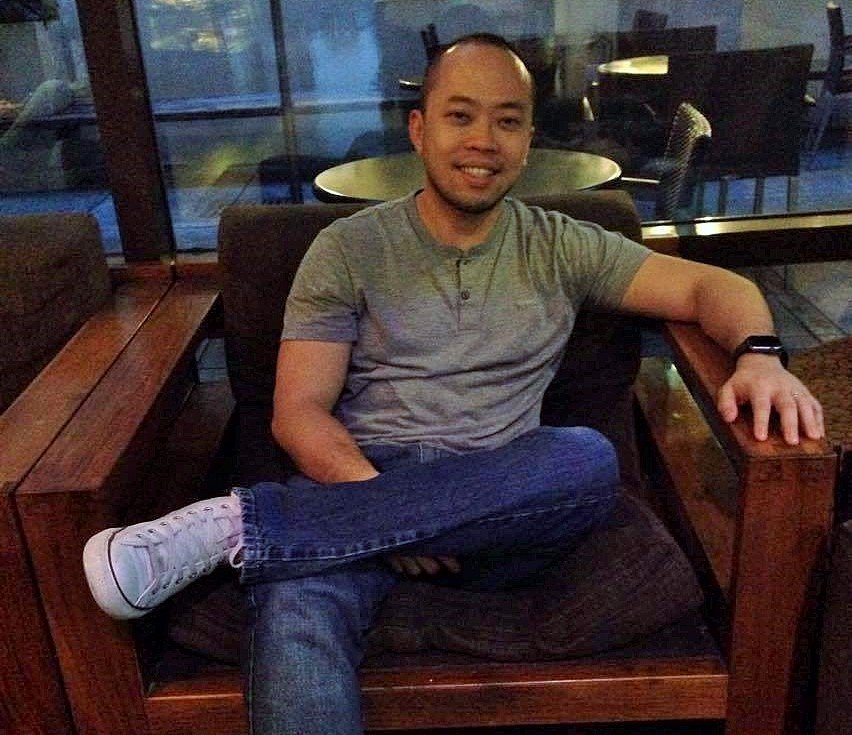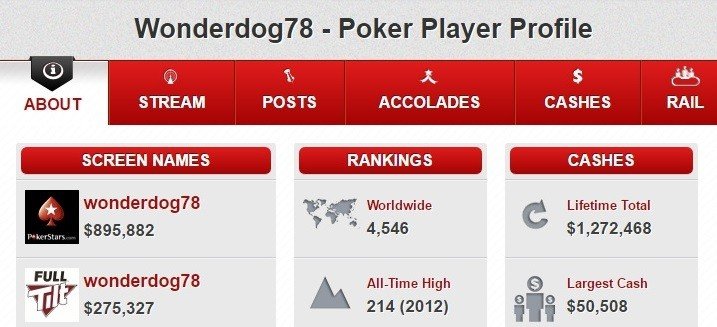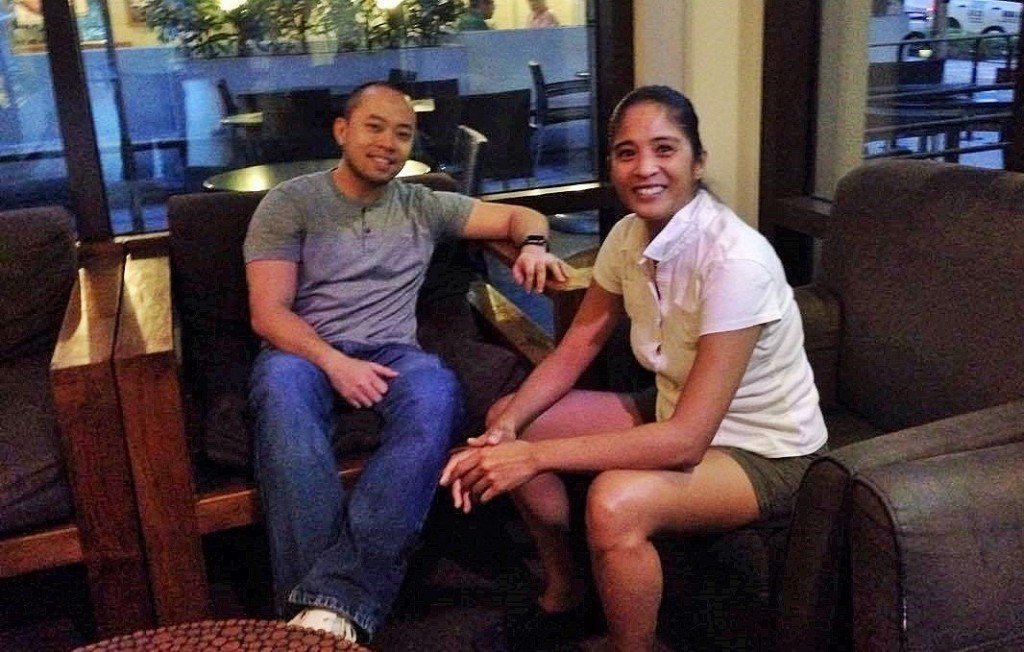Unlike a lot of Filipino players, Yves Sy chose to keep his day job and dedicate time for poker only on the weekends. If his online earnings would be taken into account ($1,272,205) he would be ranked number 2 in the Philippines all time money list behind Noli Francisco. Sy took some time to chat with Somuchpoker and share with us his alternate life on the virtual felt.

SMP: When did you start playing poker and what drew your interest?
Sy: It was in 2007, I was in the office and I saw some of my office mates playing poker online for play money and it got me curious. I used to play a lot of cards back in college so I was attracted to the game. I asked one of them about it and he said he had a friend who played with real money. His friend gave him $300 and offered to give me $50 to play for real money. I took it, played, but it was all gone in a day. That was the beginning.
SMP: Did you start playing in the online tournaments or the ring games?
Sy: My attraction has always been in tournaments. I remember looking around for some live events. Back then there was poker on TV and it piqued my interest to play a live tournament. There was this organization called PPT (Philippine Poker Tour) and they had freerolls at Players Den. So I joined one and I won it! That was it, I was hooked. You win a little bit then you think you are the best. The freeroll prize was a seat to a satellite for a bigger tournament. It was a rebuy satellite. I played it but I didn’t want to spend any money on it. I actually ended up taking second place with that single bullet and won around PhP11,000 which was great out of nothing. That’s how I got started then from there I started playing more online.
SMP: Why did you start focusing online instead of live?
Sy: Time restrictions coz I had a day job and it compensates me really well. Leaving my career to play full time poker this wasn’t really an option. And online, you can play 20 tables, much better use of your time. It’s faster, you can play a lot of tables.
SMP: How were you doing at the start?
Sy: I lost a lot of money in the beginning. I lost around $10k, and then I found Poker X Factor and started getting better. I remember my first ever win for $1200, I was super happy. Back then you could still bully and open and players would run away. So I started getting the formula and I started winning. But it wasn’t all winning right away. There was a point where I thought I should just stop playing, I was losing too much money already. You don’t know if there is a light at the end of the tunnel. You keep playing and you keep studying, but you still don’t have your first four-digit score, which back then I needed to hit that. When I did, my next mental barrier was a five-digit score. I was winning regularly but I didn’t have one yet.
One of the most memorable ones was in Full Tilt, I was playing FTops, and first prize was $95,000. It was a six-handed event, 20 players to go, I was chip leader. I thought to myself “this is it, this is my first 5-digit score”. I was chip leader with 11 players to go. But I wasn’t that smart, I was super naïve and very aggressive back then. Nowadays when I am chip leader and I am up against someone second in chips, I don’t want to play a big pot against them. You want to control the pot, which back then, was not in my poker vocabulary. So I played a huge pot. I had q-10 on a ten high board. The guy had k-10, I lost then I busted pretty much after that in 11th place. I won around $6K but I was crying about it. I was chip leader and any of the top three places could have given me my first big 5-digit score, but that was brutal. It was a big lesson for me. That was a $70k lesson. Those are my battle scars.
Luckily several months after, I got my first five digit score. I final tabled in FTops. I placed 3rd or 4th, for like $50k. Finally, mental barrier broken. The week after, I won another $12k, then another $20k. It was all that mental barrier. This was in 2010 when I started hitting the five digits regularly. I still don’t have my six digits but it is much harder to hit those. You need to run really good to hit it.

SMP: When did you decide to make a career out of playing poker?
[pullquote] I’ve never played poker full time. I almost did. [/pullquote]
Sy: That’s actually a misconception by a lot of people. I am a software engineer during the weekdays and weekends are for poker. I’ve never played poker full time. I almost did. I was doing so well in 2009-2011 that I really considered playing full time. If there were major tours I wanted to attend, I’d just take a leave from my job. But sometime in 2011, I went on a really bad downswing. I lost my bankroll so I thought to myself it was a good thing I didn’t give up my day job. I wouldn’t have been able to take the pressure of paying the bills and managing my life, my family, if I went full time in poker.
SMP: Wow! Your stats are quite impressive for just a weekend warrior. How did you bounce back?
Sy: I entered a backing agreement in 2012. I never met my backer, Elio Fox, but he’s got to be one of the nicest backers in the backing world. He won WSOP Europe Main Event in Paris in 2011. He started backing me and there was no pressure to play all the time. They backed me for two years from 2012-2014. I won some money for them but then I went on a bad downswing again, I don’t think I was playing that well, I got really burnt out, and I didn’t have the mental game sorted out. They were doing everything they could to help me, even Elio himself was coaching me, and it was awesome. Theoretically I know I was good but now that I think about it, it was the mental game that was really lacking. They eventually cut me coz I lost too much.
The problem with tournament poker is you could be playing really well but there are those crucial one or two coin flips that you need to win near the end of the tournament to make it to the final table. And you’ll have a streak where the probability is you won’t win them. When that happens it really messes you up. The problem with those moments is you don’t know if you are playing well or you are just getting too unlucky. That’s why you need a coach to go through your hand histories with you to let you know how you are doing.
SMP: What is your biggest tournament score?
Sy: FTops for around $50k
SMP: What would you attribute your success to back then? What was going on in your life?
Sy: Overall it is just variance. Back then I was killing Full Tilt. I think I was just more focused back then. Super motivated. We were trying to buy a house. I got married in 2009 so that was motivation for me. I played quite a lot. And when you are in that zone, you just feel like every time you play, you are going to win something. There was a stretch in 2010-2011 where when I would get the chip lead, you guys are all in trouble. That was it. I had a pretty good streak. Several months I’d be winning quite a bit. And good timing. I got married. Lots of expenses. Got a house. It was perfect.
SMP: How about on the flip side around 2012 onwards?
Sy: I just went down mainly I think coz I was burned out. Because of that time, I’ve learned, don’t’ play if you are not feeling great. Routine is very important. The mental game is really important. I’m finding that out now.
SMP: Can you fill us in on your poker routine?
Sy: So I am back in the grind these days having been inspired by Johnny Bax making it as chip leader of the WSOP Main Event final table this year. I spend quality time with my wife and kids until 6-7pm, have dinner then go to the gym and workout. Working out really gets the blood flowing. And then I’ll freshen up and start playing. Register into tournaments until about 1am. If I run deep then I am up until 9am, which is a really good sign. It means I am in the final table. I used to play 20 tables but I’ve cut it down to 14 coz maybe I am getting old and my reflexes aren’t as quick anymore and also I become too robotic if I have too many tables up. My quality of play really suffers when I have too many tables up. It’s tempting though, especially on Sundays. There are so many good tournaments and you always wonder if this is the tournament for me. Happens all the time and next thing you know, you have so many tables up. So I am trying to really minimize and cut down to 14 tables.
SMP: So you took a short break after getting burned out. What brought you back to the grind?
Sy: One of my poker idols back in 2007, Johnny Bax, real name is Cliff Josephy, he was the top online player back then. This guy was so entertaining to watch, he even chats with the railbirds so it was a lot of fun. He was my favorite player. I noticed he opened a training site, one of first the training sites back then, so I registered and from there my game started picking up. I learned a lot from these guys. This is the reason why I started playing again. I stopped playing for about a year or two around 2014. Then this year, my idol, entering the WSOP November 9, he is the chip leader. He was my mentor. I was emailing him about strategy, and he was very responsive. So “old school” is back. I started thinking, maybe the strategy of the old school guys still works. I decided to try and started playing again. The very first session, I final tabled two tournaments right away. So I decided to give this a shot again.
SMP: What stakes do you play these days?
Sy: Right now I am rebuilding my bankroll so I am playing small to medium stakes. I usually play $50 and below. When I play the Sunday Millions or recently the WCOOP, I also play the $200 buy-in tournaments. Those are really good value.
SMP: Compared to the level then and now online, how do you adjust?
[pullquote]It’s about handling tilt, it’s really all about psychology.[/pullquote]
Sy: You try to find these small edges. For me it really is the physical and mental game. Being able to stay sharp so I can find the weak spots at the table, exploit certain players, but because there are much less of these, it really is finding the edge because today there are less players to pick on. Most of them play back at you and are not afraid of your big stack. One thing I’ve neglected the first 9 years of my poker life is the mental game. That’s what I am planning to focus on now. I’ve been coached by some of the top players and a lot of them are really into mental game coaching these days. It’s about handling tilt, it’s really all about psychology. Nothing to do with theory. Even if you are really good at theory but not strong mentally, your results won’t be that great. Take Fedor Holz for example, he’s really big on the mental game. In a mental game, there’s a bit of hypnosis there, there’s a little bit of psyching yourself up to play better. It’s about getting into a routine which is what I am trying to do these days coz back then I play whenever I feel like which is not good. Now before I play, I make sure I go to the gym, take a shower, have a good meal, something healthy, it’s that type of approach.
SMP: What do you think is the biggest difference between online and live tournaments?
Sy: The difference between online tournaments and live tournaments I think is more pronounced in Asia while in the USA, the players play both live and online so the game there is much more mathematical and based on sound poker theory. And they rarely make mistakes. Asia is more like gambling. It has a higher variance but it is much more like gambling. The Asian guys who crush tournaments here do well here because their style works here, only in Asia, and everyone else is not great in poker theory and math. But if you try that style in the west, go to Europe or the US, the good players are really good, they’re not going to make mistakes in terms of theory and math, so they will get exploited. There is still quite a bit of a gap, but it also has improved. If you were to compare it to online tournament stakes, they play here more like a $20 online tournament.
SMP: In terms of success online, you’ve persevered. If your online earnings would be taken into account ($1,272,205) you would be ranked number 2 in the Philippines all time money list behind Noli Francisco ($ 1,348,630). Do you think online players deserve more recognition?
Sy: Live tournaments will always get the recognition because of TV. But if you notice, more and more online players are winning big live tournaments so they do get the recognition.
SMP: What are your short term and long-term poker goals?
For me it is to study the mental game. I already have a couple of books cued up. I’m probably going to get a membership to Runitonce.com to get back into what’s going on. Those are my immediate goals. Usually when you set goals you don’t set it in terms of revenue but more like how many games you’ll play per month. That would be a goal coz you cant control how much you’ll make. The goal is usually by volume not by money. As a weekend warrior, I’m going to work on modernizing my game.
SMP: Where does poker stand in your life?
Sy: It is just a weekend thing for me. It’s not going to change. I love my day job. Great gig. I don’t see myself not doing that.
SMP: What’s your greatest achievement or greatest memory as a poker player?
Sy: The most fun was PCA 2011 in the Bahamas. I was at the top of the Philippines leaderboard for several years, and being the top player, I was invited to the World Cup of Poker. You play freerolls to try and get your country in and represent your country in the WCP in PCA. The country with the best cumulative score qualifies and we qualified. PS sent us money and sent us to the PCA for nine days. There were five of us in the team. I figured I was already there so I played the $10K Main Event. I ran deep. I ended up finishing 59th out of around 1600 players. It was a good cash. That was really memorable for me. Also, the Bahamas was beautiful. That was a lot of fun.
SMP: What advice would you give to someone who is thinking about playing online tournament poker as a living?
Sy: Find a job (laughs). Find a good stable income first. Work your way slowly up. You have to put in the work. Read up on the theories. Scour the strategy section of 2+2. Watch online training videos. Maybe register in some. Work on your physical aspect. It does help you to stay sharp mentally. But really, get a stable job first. And I say that so you don’t feel the pressure nor pressured to win right away. Do it on the side. Sometimes I see poker as a blessing and a curse for me. It’s a blessing that I have the skills to do it, but it’s a curse every time I find myself at 8am taking a bad beat. You have to do it coz you have this skill but it really is challenging mentally.
SMP: Curious, why wonderdog78?
Sy: (laughs) If I had a chance to change it, I would. It’s like an inside joke between me and my wife, she was my girlfriend back then. If I had known, I would have chosen a cooler name.
Interview by Triccia David





